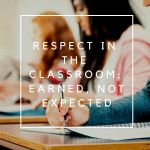I was standing at the edge of a large hole, collectively dug by four third-grade students. Two were continuing to dig, while one peered in curiously. The fourth student was collecting some kind insect larvae.
“I’m going to take them home as pets!” He proudly proclaimed.
With five weeks left in the school year, my school’s third, fourth and fifth grades took a trip to Carnegie Hall as part of an incredible program called Link Up! Afterwards, we took advantage of the spring weather with a trip to a playground in Central Park.
It was here where the students set to digging. I loved it for the opportunity it gave me to see my students in a whole new light. I saw my students display levels of self-direction, curiosity, engagement and cooperation that have been difficult at times to cultivate in the classroom.
To be fair, for most eight-year-olds, multiplication is no match for digging holes. Still, the experience illuminated a missing component of my students’ day-to-day schooling: play.
We work hard, often in groups and with hands-on activities. Using the Responsive Classroom approach, we make time for team builders, Solo Time and Choice Time. My students and I love these various experiences and they are a type of play, but none of them replace the singular type of growth provided by free, unstructured play.
Experts have lamented the decline of play in elementary (and particularly early elementary classrooms) for some time now. The New York Times featured an op-ed on the end of imaginative play in lower elementary just last week. The op-ed quotes David Whitebread, a psychologist at Cambridge University as saying:
“[Play is] essential to [kids’] development. They need to learn to persevere, to control attention, to control emotions. Kids learn these things through playing.”
At my school, the biggest challenge is our playground which we call “The Yard”, a name which all too readily conjures up connections to the “school to prison pipeline”. “The Yard” is a roughly 40 foot by 40-foot space enclosed by tall fence (again, the prison similarities come to mind). Roughly 120 students divided by upper grades (3-5) and lower grades (K-2) share this space for 20 minutes a day, weather permitting. This falls far short of the recommended 60 minutes. And while some of my students make up this lost time through after school sports or family trips to the park, many do not.
Access to play space is a common problem in New York City public schools. Although playgrounds can be found in practically every neighborhood, the quality of these playgrounds if far from equal. Furthermore, rich schools and poor schools don’t take advantage of their nearby playgrounds in equal amounts, because rich schools have certain freedoms beyond the financial.
As teachers across the country know, play isn’t just out of fashion because of new research. It is disappearing because of the pressure for students, teachers and schools to succeed academically as narrowly measured by standardized tests. But this pressure isn’t evenly distributed. Wealthy schools – public and private – that serve mostly white students are generally free from this pressure. Meanwhile schools like mine are caught in a trap, trying to catch up without the resources to do so.
Ultimately play is just one more privilege my students aren’t afforded. It’s just another byproduct of a deeply unequal educational system that provides countless resources for some schools, but not mine and allows some schools the freedom to choose certain priorities, but not mine. But when I watched my students in the park the other day it reminded me why the loss of this privilege hurts a little more. Because watching my students play could show me a whole side of them that sometimes feels impossible to see in the classroom. And it would allow my students to grow as individuals and a community in ways they just can’t otherwise.
Remembering this reminds me of my responsibility to fight for my students’ time to play in my classroom and outside it as much as possible.





